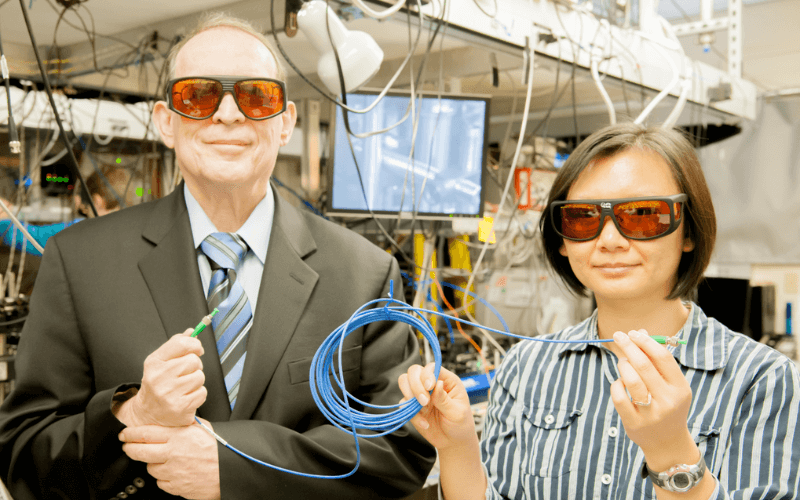Quantum computing is a new type of computing that uses the principles of quantum mechanics to perform calculations. Quantum computers are still in their early stages of development, but they have the potential to solve problems that are intractable with traditional computers.
One of the most promising applications of quantum computing is in cryptography. Quantum computers could be used to break current encryption methods, which could have a major impact on cybersecurity. Quantum computers could also be used to develop new drugs and materials and to simulate complex systems such as climate change and protein folding.
The development of quantum computing is a major scientific and technological challenge, but the potential benefits are immense. If quantum computers are able to live up to their potential, they could revolutionize many aspects of our lives.
Table of Contents
Quantum computing is a rapidly developing field with the potential to revolutionize many aspects of our lives.
Here are some of the problems that quantum computing could solve:
The development of quantum computing is still in its early stages, but it is a rapidly growing field. There are a number of companies and governments that are investing heavily in quantum computing research. It is still too early to say when quantum computers will be widely available, but the potential benefits are immense.
- Drug discovery: Quantum computers could be used to simulate the behavior of molecules, which could help scientists develop new drugs and treatments for diseases.
- Materials science: Quantum computers could be used to design new materials with desired properties, such as being more resistant to corrosion or heat.
- Climate change: Quantum computers could be used to simulate complex climate models, which could help scientists to better understand the causes and effects of climate change.
- Artificial intelligence: Quantum computers could be used to develop new AI algorithms that are more powerful and efficient than current AI algorithms.
- Machine learning: Quantum computers could be used to train machine learning models on much larger datasets than is currently possible.
- Cryptography: Quantum computers could be used to break current encryption methods, which could have a major impact on cybersecurity.
- Finance: Quantum computers could be used to develop new financial models that are more accurate and efficient.
- Transportation: Quantum computers could be used to develop new transportation systems that are more efficient and sustainable.
- Manufacturing: Quantum computers could be used to develop new manufacturing processes that are more efficient and precise.
- Breaking encryption: Quantum computers could be used to break current encryption methods, which could have a major impact on cybersecurity.
- Designing new materials: Quantum computers could be used to simulate the behavior of materials, which could help scientists design new materials with desired properties.
- Simulating complex systems: Quantum computers could be used to simulate complex systems such as climate change and protein folding. This could help scientists to better understand these systems and to develop new ways to control them.
These are just a few of the potential benefits of quantum computing. As the technology continues to develop, we can expect to see even more innovative applications for quantum computing in the years to come.

However, it is important to note that quantum computing is still in its early stages of development. There are many challenges that need to be addressed before quantum computers can become widely available.
Here are some of the challenges that need to be addressed before quantum computing can become mainstream:
- Complexity: Quantum computers are very complex devices, and it is difficult to build and operate them.
- Error correction: Quantum computers are prone to errors, and it is necessary to develop techniques to correct these errors.
- Applications: There are still a limited number of known applications for quantum computing.
Despite these challenges, the potential benefits of quantum computing are immense. It is a field of research that is worth watching closely.
Here are some Quantum computing-related Details:
- What is quantum computing?
Quantum computing is a type of computing that uses the principles of quantum mechanics to perform calculations. Quantum computers are still in their early stages of development, but they have the potential to solve problems that are intractable with traditional computers.
- How does quantum computing work?
Quantum computers use quantum bits, or qubits, to perform calculations. Qubits can be in a superposition of states, which means that they can be in more than one state at the same time. This allows quantum computers to perform calculations that are exponentially faster than traditional computers.
- What are the applications of quantum computing?
Quantum computing has the potential to be used for a wide variety of applications, including:
* Breaking encryption
* Developing new drugs
* Designing new materials
* Simulating complex systems
* Artificial intelligence
* Machine learning
- What are the challenges of quantum computing?
The main challenges of quantum computing are:
* Complexity: Quantum computers are very complex devices, and it is difficult to build and operate them. * Error correction: Quantum computers are prone to errors, and it is necessary to develop techniques to correct these errors.
* Applications: There are still a limited number of known applications for quantum computing.
- What is the future of quantum computing?
The future of quantum computing is uncertain, but it has the potential to revolutionize many aspects of our lives. It is a field of research that is worth watching closely.
Despite these challenges, the potential benefits of quantum computing are immense. It is a field of research that is worth watching closely.
Fortnite Chapter 3 Season 3: Vibin